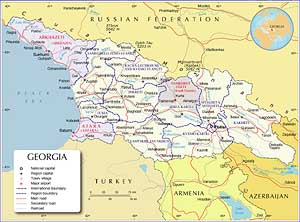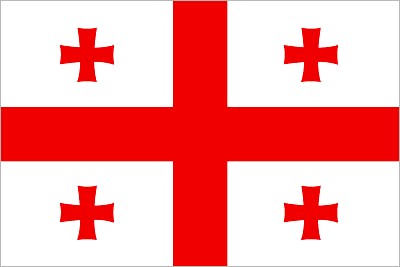-
- Georgia Map
|
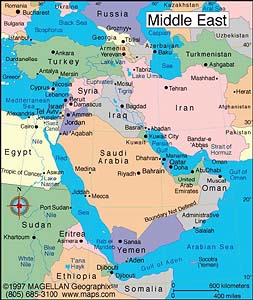 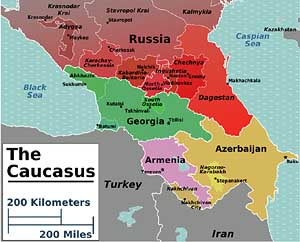 -
- Mid-East Map
Caucasus Map
-
|
|
-
|
- latest picture: July
30, 2013
|
-
-
-
-
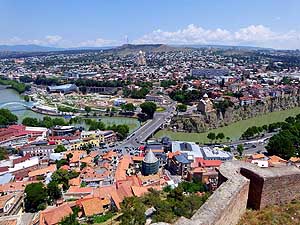
|
-
-
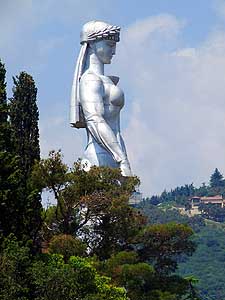
|
-
-
-
-
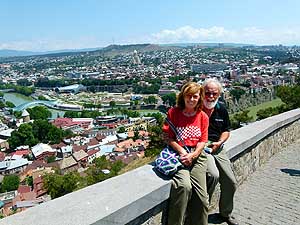
|
- 088
Panorama from the Nariqala Fortress
- over the city of Tbilisi with its 1.2m people.
- It has been the capital of Georgia for over
- 1’500 years. It extends along both sides
- of the Mtkvari River and has a relaxed
- atmosphere
|
- 089
With a sword in one and a cup of
- wine in the other hand a 66ft. tall
silvery
- woman statue, called Kartlis Deda –
- “Mother of Kartli“, reigns over the
city.
- The wine symbolizes the hospitality of
- the Georgians and the sword the
- readiness to fight the enemy
|
- 090
We make a souvenir photo above
- Tbilisi where the first traders and camel
- caravans stopped on their long journeys
- along the Silk Road from Asia to
Europe.
- Since mid-2012 an aerial tramway makes
- an easy access from Rike Park to the
- Nariqala Fortress
|
-
- 6/23/2013: Returning from
Azerbaijan before noon and after
completing the fast and easy entry procedures of our second visit to
Georgia at the Ikinci Sixli border post, both of us are longing just
for one thing: A tasty „Khachaburi“ – a Georgian cheese speciality –
and a huge beer. Are we eventually already addicted? However only
mid-afternoon we are sitting in front of this favorite dish at a
pizzeria close to our Hotel „Mkudro“ in Tbilisi where we got a room
for 60 Lari (GEL) (US$37). Actually it is rather a homestay where we
feel immediately at ease. Besides, at the entry there is an apricot
tree, which provides us with sweet ripe fruits that constantly fall
to the ground. They taste wonderfully.
-
- Mid morning next day, Emil drives our LandCruiser through the
busy city traffic of the capital to our embassy to finally collect
our new passports. Again we are invited inside and offered a cup of
coffee. This time, we have also the honor to meet our ambassador Mr.
Bächler. Leaving the embassy, Mrs. Renggli, our consul, gives us the
phone number of her driver Giorgi who has his day off today, but
whose father has a garage. We might be able to let repair the front
right main spring leaf of our Landcruiser which broke into two
pieces in Azerbaijan. We pass by in
the afternoon but cannot decide on leaving our LandCruiser there for
two days. We postpone it to after our return from
Armenia, hoping that the clamps will
hold!
|
-
-
-
-
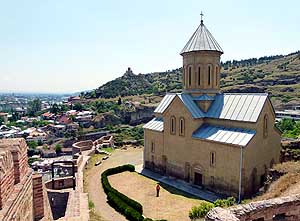
|
-
-
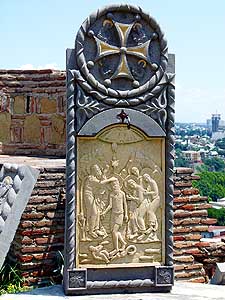
|
-
-
-
-
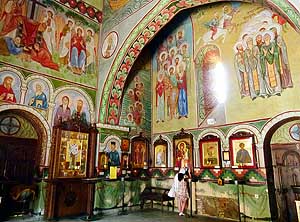
|
- 091
The Church of St. Nicholas stands
- inside the Nariqala fortress walls. After
- its destruction together with the fortress in
- 1827 by an explosion of a Russian munitions
- storage (some say it was an earthquake),
- it was rebuilt in 1990 .....
|
- 092
..... a beautiful relief decorates
- the inner court yard of the church –
- looks like a cross stone (khachkar) .....
|
- 093
..... the walls in the interior of the
- St. Nicholas Church are covered from
- floor to ceiling with brightly
- colored frescoes
|
-
- The sunny cloud-free day invites to explore the city with its
1.2m people. Tbilisi has been the capital of Georgia for over 1‘500
years and extends along both sides of the Mtkvari River. The city
where the first traders and camel caravans rested on their long
journeys along the silkroad from Asia to
Europe has a relaxed atmosphere. We take
the aerial tramway to the Nariqala Fortress which since mid 2012
runs from the Rike-Park.
-
- In the 4th century the fortress still was a Persian citadel.
Eyecatching is a 66ft. [20m] tall silvery woman statue, called
„Kartlis Deda“ (Mother of Kartli). On Sololaki Hill she reigns over
the city with a sword in one hand and a cup of wine in the other
hand. The wine symbolizes the hospitality of the Georgians and the
sword the readiness to fight the enemy.
|
-
-
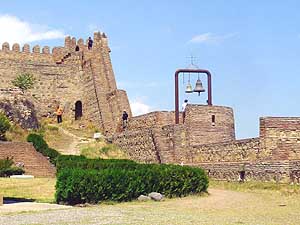
|
-
-
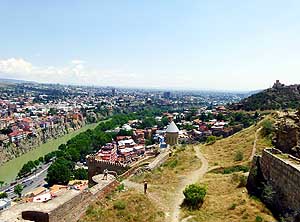
|
-
-
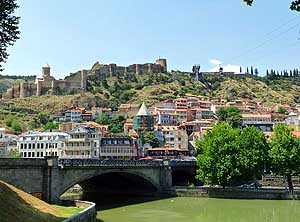
|
- 094
Most of the present walls of the
- Nariqala Fortress were built in the
- 7th and 8th century by Arab emirs, the
- Umayyad dynasty, whose palace
- was inside the fortress
|
- 095
Right through the center of Tbilisi flows
- the Mtkvari River that comes as Kura River
- from eastern Turkey and continues
again as
- Kura River to Azerbaijan, where it
enters
- finally the Caspian Sea. It separates the
- historic Old Town from modern Tbilisi
|
- 096
View to the Nariqala Fortress from
- the 17th century which existence goes back
- to the Shuris-tsikhe (= “invidious fort”) in
- the 4th century. Behind the bridge is the
- scaffolded Armenian Cathedral St.
George
|
-
- The city panorama that extends below us is beautiful. Right to
its center flows the Mtkvari River. Across the river, on Elia Hill,
the Tsminda Sameba Cathedral with its golden dome rises above the
roofs of the city. The wide sprawling cityscape is characterized by
historic and modern, partly futuristic glass constructions.
Eventually we break away from this wonderful view and wander
together with many Russian speaking tour groups through the ruins of
the fortress and to the site of the Church of St. Nicholas with its
beautiful frescoes. After it was heavily damaged together with the
fortress in 1827 by an explosion of a Russian munition storage, it
was rebuilt in 1990.
-
- The descent we tackle by foot and then treat ourselves in a
garden restaurant with our favorite food „Khatchaburi“ and beer –
what else? before we head to the cathedral „Tsminda Sameba“ on Elia
Hill with its 346 ft. [105.5m] high golden dome, built between 1995
and 2004. It is the biggest symbol of Georgia’s post-Soviet
religious revival. Impressing is its imposing size and the ample
space in the interior. The five ailes are open and rise vertically
up to the 276 ft. [84m] high dome. Worthshippers illuminate candles
and pray in front of their saint images and a Georgian orthodox
priest takes the vows of a wedding couple. Can a sightseeing tour
end lovlier? It is rushhour when we drive back to our hotel.
|
-
-

|
-
-
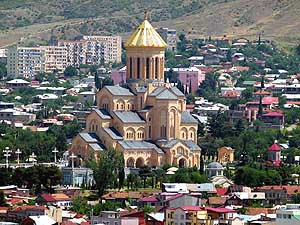
|
-
-
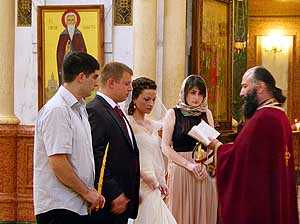
|
- 097
Behind the baths sits Tbilisi's only
- mosque, a Sunny, built in 1895. The Shiite’s
- one was destroyed in 1950 due to the
- construction of the Metekhi bridge. Very
- unusually, Shiite and Sunni Muslims
- pray now together there
|
- 098
On Elia Hill high above Tbilisi rises
- the “Tsminda Sameba Cathedral” (Holy
- Trinity Cathedral), built between 1995
- and 2004. Its golden dome is 346 ft. high.
- It is the biggest symbol of Georgia's
- post-Soviet religious revival .....
|
- 099
..... in the central aisle a
- Georgian Orthodox Priest takes
- the vows of a wedding couple
|
-
- After Emil has processed our visa application for
Abkhazia via internet the following
morning, we actually would be ready to continue our journey to
Armenia, but then all of a sudden my
laptop gets inoperative. The screen turns black and all efforts to
revive it are in vain. After three years, it has irrevocably stopped
working. Coincidentally, also Emil’s four years old Lenovo rattles
badly already since quite some time. Therefore we now need time to
put in action the new Lenovo laptop that our friends Ursula and
Marco brought us to Oman in February.
It is not an easy task and Emil is not happy at all changing from
Windows XP to Windows 8. At least, in the evening he has managed to
install most of the programs. But for whatever mishap his whole work
of 12 hours is gone again. When he wants to restart, the laptop does
not recognize the password anymore and deletes everything.
Frustrated we go to sleep.
|
-
-

|
-
-
-
-
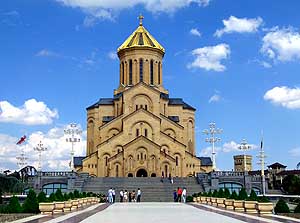
|
-
-

|
-
100
The free standing bell-tower of
- the “Tsminda Sameba Cathedral” is
- an attraction in itself
|
-
101
At the construction of the
- “Tsminda Sameba Cathedral” traditional
- Georgian architectural forms in concrete,
- brick, granite and marble were used .....
|
-
102
..... the five aisles are open
- and rise vertically to the 276 ft. high
- central dome what gives a feeling
- of space and brightness
|
-
- We start everything from scratch and this while outside a bright
sunny day with blue skies lures. But finally we get there and our
departure day comes closer. Emil still greases the long overdue
nippels of the LandCruiser and realises
that only one jack is still working. Thus, apart of new reading
glasses for Emil, safety jackets, stretching straps, grease,
distilled water, engine oil we now also need to look for a new jack.
As last function before our onward journey we cut each others hair
like we have done it for the past 29 years!
|
-
-
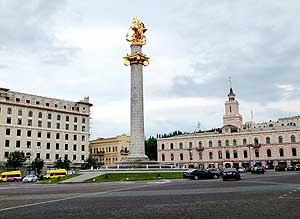
|
-
-
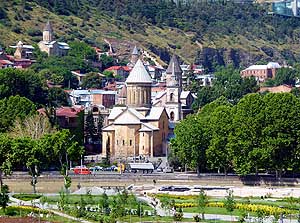
|
-
-
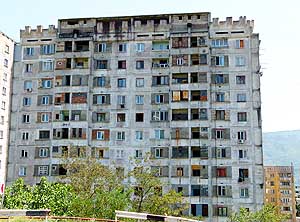
|
-
103
The Freedom Monument
- (St. George Statue) – built 2006 –
- on Freedom Square is dedicated
- to Georgia’s independence
|
-
104
Church towers rise everywhere
- from Tbilisi's rooftops. In front the “Tbilisi
- Sioni Cathedral“ with its bright dome; just to
- the right its three-story bell-tower; exactly
- behind it the “Norashen Armenia Church“
- with a dark dome; in the far back the
- “Jvaris Mama Church“; and on the left
- side the “St. George Cathedral“
|
-
105
One of the still existing and inhabited
- ugly buildings from the Soviet era at the
- northern outskirts of Tbilisi (Vashlijvari
- Settlement). The rendering is fading
- away everywhere
|
-
- On the day when we were supposed to
leave it happens as it often did during our epic journey:
I have almost finished to pack everything into our LandCruiser; Emil
is still sitting at his laptop when he says: „I think we should
leave only tomorrow. I need to prepare myself better for Armenia via
the internet.“ Not again! It is always the same. „Why can you not
tell me that before I start packing“ I exclaim upset“. But it is
final!
-
- In the afternoon I lament again about my lost text during my
computer crash while Emil tries to remove the harddisk before we
dispose the crashed laptop. It is not as easy, also using force does
not help. Enervated he reassembles everything again. Suddenly I hear
him saying „I don't believe it, now it is working again“ He does it
the same unemotional way he did way back in April 1990 in African
Guinea Bissau, when in the backyard of a mission a snake slithered
between our camping table and our stove while we were having lunch.
Of course I am very excited: „Please copy firstly of all my text“ I
beg him. No sooner said than done. One would not believe it: As soon
as Emil finished with it, the thing is dead again. If this wasn't
luck!
|
-
-
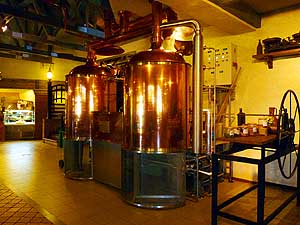
|
-
-
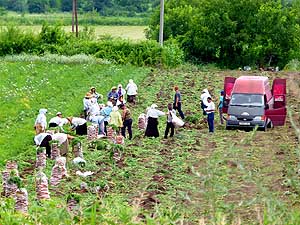
|
-
-
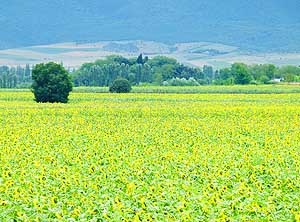
|
-
106
In a restaurant along the Mtkvari
- River at the Akaki Beliashvili Street in
- northern Tbilisi a brewery is integrated
|
-
107
7/2/2013: En route to Sadakhlo
- and Bagratashen, the border villages of
- Georgia and Armenia, it gets rural:
- On a field, carrots are harvested
- and packed into big bags .....
|
-
108
..... and shortly before the border
- sunflowers are blooming, almost as
- far as the eye can see
|
-
- Before noon the next day it is time: We set off towards
Bagratashen, Georgias border post to Armenia.
The young guy at the immigration booth does not understand that we
give him a brand new passport and that Georgia’s entry stamp is
still in the old one, now full to the brim. He calls his boss who
gives him directions and then puts the exit stamp on the last page
of our new passport. Are these new methods? The exit customs waves
us through with a smile. With it, our second visit to Georgia ends,
but Georgia #3 will arrive for sure (further below)!
|
-
|
- On July 2nd, 2013, we end after 8 days our second visit of
Georgia – mainly Tbilisi –
- and explore our 175th country
Armenia for the first time. We return
after 12 days in Armenia and 8 days in
- Nagorno Karabakh from
Armenia’s the 2nd part on
July 22nd, to our 3rd visit of
Georgia
|
-
-
-
-

|
-
-
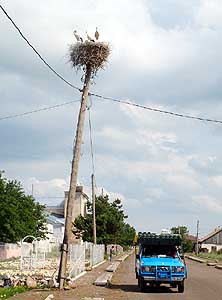
|
-
-
-
-
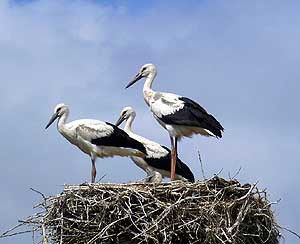
|
-
109
7/22/2013: Coming from Armenia,
- shortly after the Georgian border post at
- Ninotsminda, the rural, nostalgic charm
is
- greeting us again
|
-
110
In the little village of Zhdanovi along
- “Mada” Lake we spot a stork’s nest high
- on a pole and stop below .....
|
-
111
..... who is more curious? The ones
- looking up, or the ones looking down?
|
-
- Coming from the costly Armenian exit
border (!), our third entry to Georgia at Bavra was a nice surprice
due to its free and easy
handling. No roadtax and no other fees as in the previous country.
Right after the border, in Zhodanovi, we are greeted by rural charm
again. High up on pylons stork’s nests with their offspring surprise
us. What a lovely reception! It is already 4pm when we branch off at
Ninotsminda to the new road to the east towards the capital Tbilisi
– a region where three lakes are marked on the map. At the first
lake "Tha Saghamo" – the smallest and most natural one – we find an
idyllic camping spot. A herdsman is guiding his cattle down to the
water. Then there is complete silence.
|
-
-
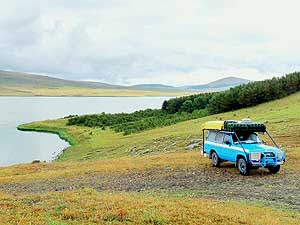
|
-
-
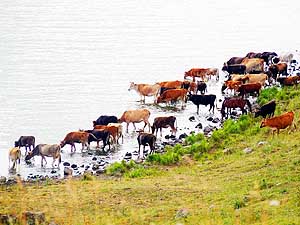
|
-
-
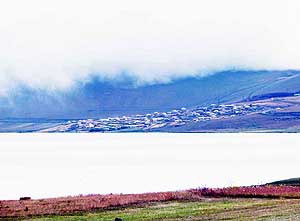
|
-
112
Shortly after Ninotsminda we take a
- right turn to a renewed road leading to Tbilisi
- and find an idyllic night spot at the small
- "Saghamo" lake, the first one of three
- lakes in a row .....
|
-
113
..... a herdsman guides his cattle
- down to the water, then it gets quiet
|
-
114
Morning mist still hangs over the
- village of Tambovka across lake
"Paravani"
- between Ninotsminda and Tbilisi
|
-
- Morning mist engulfs us when we get up. It's wet and cold. We
take breakfast in the car and continue our ride on the new road
towards the capital, passing through typical Georgian rural
villages. Mist, rain and drizzle are our constant companion during
most of the time. We again check into the hotel „Mkudro“, the same
hotel as before on June 23rd, about 12 miles [20km] outside the city
center.
|
-
-
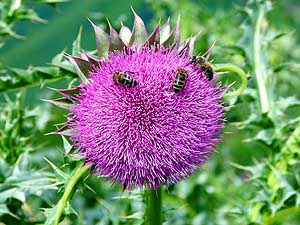
|
-
-
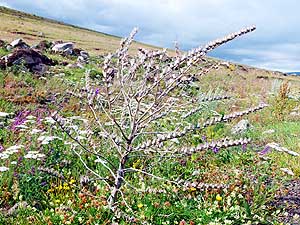
|
-
-
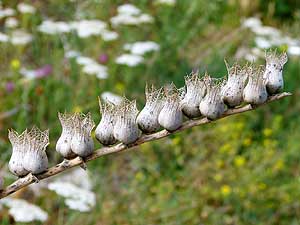
|
-
115
Bees are attracted by the strong
- pink of a blooming “musk or nodding thistle”
- (Carduus nutans)
|
-
116
Funny white "cups" grow on the
- roadside out of thin branches .....
|
-
117
..... detail of the funny "cups"
|
-
- The handy is ringing. It is Tomas from Spain, who is on tour for
a few months with his wife Beatrix and with his 3 years old
LandCruiser. Today, coming from Armenia,
he also reached Tiflis. He wants to take a room in the old city.
Therefore we agree to meet next morning at 11am at the aerial
tramway leading to the Nariqala Fortress.
|
-
-
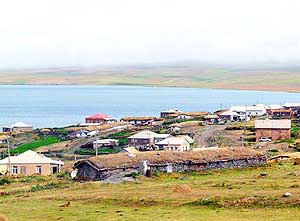
|
-
-

|
-
-
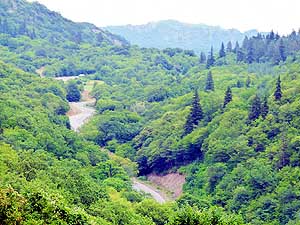
|
-
118
A typical Georgian rural village:
- Paravani along the same-named lake,
- located between Ninotsminda and Tbilisi
|
-
119
Rain made mushrooms sprout. Egg
- mushroom are sold in baskets along the road.
- It is tempting, but we do not trust them
|
-
120
The new road from Tsalka via
- Marneuli to Tbilisi runs through
- a lovely forested area
|
-
- On our almost 29 years of traveling we have not often met
travelers we only know per email. We therefore are really excited to
get to know now Beatriz and Tomas personally. Both are speaking good
English. They earn a living with book translations from Spanish into
English and French.
|
-
-
-
-
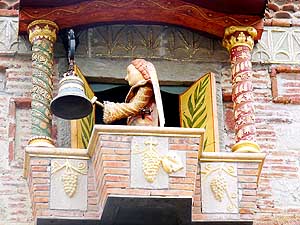
|
-
-

|
-
-
-
-
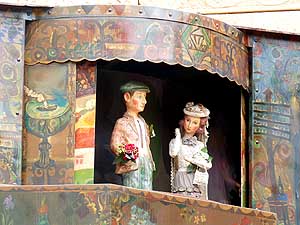
|
-
121
At the clock tower in Tbilisi's Old
- Quarter each hour a golden door opens
- on the upper balcony. An angel appears
- and marks with 12 strokes of the gong
- the full hour .....
|
-
122
..... the clock tower itself looks like
- something out of a fairy tale – leaning and
- cobbled together, built 2011 by Rezo
- Gabriadze. In the back a puppet theater is
- “concealed”. Beatriz and Tomas from Spain
- pose for a picture together with Liliana
|
-
123
Below the clock another screen
- opens after the stroke of the gong. The
- puppets that appear show five circles of
- life: Boy meets girl; marriage; childbirth;
- old age and funeral
|
-
- Together we explore the little alleys of the old quarter in
Tbilisi and are standing in front of the clock tower, built 2011 by
Rezo Gabriadze. Exactly
at 12am on the upper balcony a golden
door opens and an angel appears and marks with 12 strokes of the gong
the full hour. Below the clock another screen opens and a puppet
shows appears, showing five cycles of life: Boy meets girl,
marriage, childbirth, old age and funeral. It is a bit like in a
fairy tale.
|
-
-
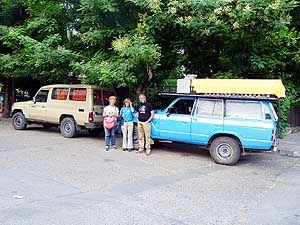
|
-
-
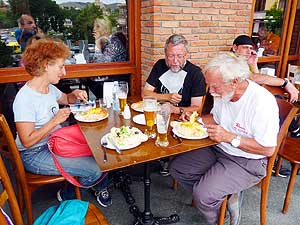
|
-
-
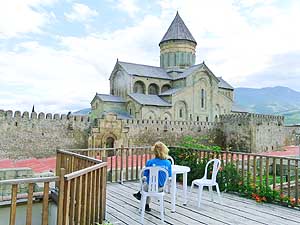
|
-
124
After a couple of emails it worked
- out: In Tbilisi we meet Beatriz and Tomas
- from Spain with their 3-years young
- LandCruiser. Their 8-months journey through
- Central Asia will soon come to an end .....
|
-
125
..... together we enjoy at the Meidan
- Square in Dzveli district the Georgian dish
- "Khachapuri" – a cheese pie that comes in
- different variations
|
-
126
Liliana enjoys the view from the
- Hotel Tamarindi in Mtskheta, about
- 12 miles north of Tbilisi, of the Svetitskhoveli
- Cathedral in the old city. It was the most
- important church in Georgia until the
- construction of the “Tsminda Sameba
- Cathedral” in Tbilisi (pict. #98+101)
|
-
- After that, the aerial tramway carries us up to the Nariqala
Fortress. It is the second time that we enjoy the rambling view over
the attractive capital with its meandering river, its bridges and
church towers raising above the city roofs everywhere. With beer and
„Khachaburi“ – Georgia’s cheese cake speciality and Emil’s favorite
dish – our lovely and interesting traveler meeting comes to an end.
|
-
-
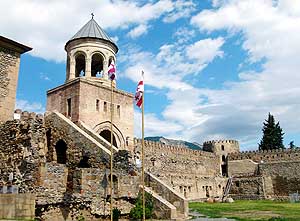
|
-
-

|
-
-
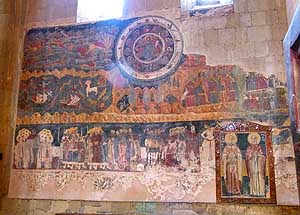
|
-
127
The “Svetitskhoveli Cathedral” of
- Mtskheta dates from the 11th century. Some
- say that the original church was built on the
- site of a former Zoroastrian temple and thus
- marks Georgia's conversion to Christianity,
- others that St. Nino chose the place in the
- 4th century at the confluence of the rivers
- Mtkvari (Kura) and Aragvi
|
- In the interior of the “Svetitskhoveli Cathedral” the walls show
some beautiful
- and extraordinary frescoes. The cathedral is a UNESCO world
heritage site
|
-
128
Access to the main altar
|
-
129
These frescoes show the zodiac
- sign (circle) as well as the “Beast of the
- Apocalypse” (middle left) what is
- rather unusual in a Christian church
|
-
- Travelers often have the same needs what shopping is concerned.
Yesterday we talked to Beatriz and Tomas about the French
supermarket Carrefour at the northern peripherie of the capital. And
who is arriving dead on time like us? Our new traveling buddies.
Both are replenishing groceries and both want to drive on the
"Georgian Military Highway" to Kazbegi into the mountains – a very
scenic mountain pass leading to Russia,
the only traffic axis between the two countries. With an appropriate
Russian visa the border crossing is now open since some time to
everybody.
|
-
-
-
-
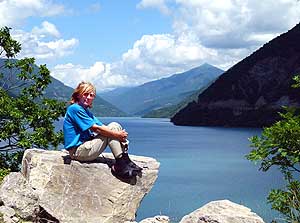
|
-
-
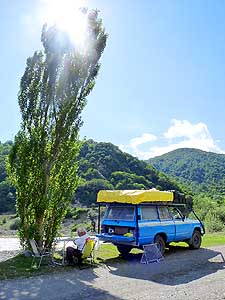
|
-
-
-
-
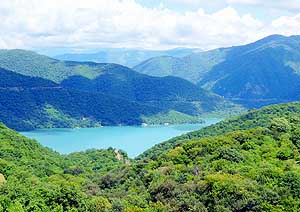
|
-
130
On the Georgian Military Highway
- to Kazbegi Liliana enjoys the turquoise
- Zhinvali Reservoir. The border to Russia
- – now open since June 2012 also to
- international tourists – is only about
- 10 miles from Kazbegi
|
-
131
A small break along the touristy
- Georgian Military Highway and the Aragvi
- river. We encounter people from Germany,
- France, Armenia,
Ukraine with cars,
motor-
- bikes and bicycles, but mostly Russians
- from home or back home
|
-
132
The Zhinvali Reservoir is surrounded
- by a beautiful forested landscape. The
- biggest part of Tbilisi’s drinking water
- is caught here and channeled in a
- 18 ft. Ø tunnel to the city
|
-
- Traveling together however doesn't work out. Black skies are
developing in the Caucasus mountains promising rain. We decide to
wait until the weather improves, but the Spaniards have a tight time
schedule. They want to be back home in Spain
already in September 2013 (now we have July 25th). They hit the road
and we take a room at the Tamarindi Hotel in Mtskheta, the next
town, 12 miles [20 km]
northwest of Tbilisi. It sits in the historic old city right
opposite the Svetitskhoveli Cathedral. From its terrace we have a
superb view to the church complex and the never ending flow of
tourists strolling past our parked LandCruiser. Many pause to admire
our „freedom machine“.
|
-
-
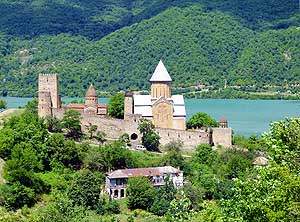
|
-
-
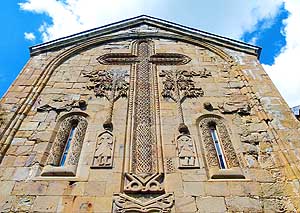
|
-
-
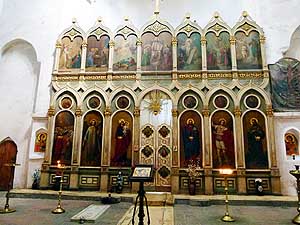
|
-
133
The Ananuri Fortress dating from
- the 17th century, 41 miles north of Tbilisi,
- enchants by its classic Georgian architecture
- and its beautiful location. It made it to the
- front cover of the 4th edition of the
- Lonely Planet Guidebook of June 2012
|
-
134
The Church of the Assumption
- within the Ananuri Fortress has a
- wonderfully carved grapevine
- cross on its south side .....
|
-
135
..... and in the churches interior
- fine icons at the altar
|
-
- Next morning the tourist flow hasn't yet begun when we marvel at
the beautiful frescoes and carvings of the Mtskheta‘s Svetitskhoveli
Cathedral. For the Georgian-Orthodox this cathedral is one of the
most revered places of worship. It is said that here the coat of
Jesus Christ lies burried. Currently it is also the seat of the
archbishop of Mtskheta and Tbilisi who at the same time is also the
catholic patriarch of the whole of Georgia.
|
-
-
-
-
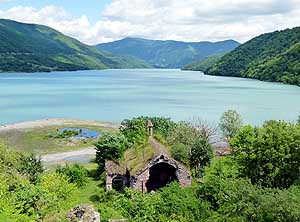
|
-
-
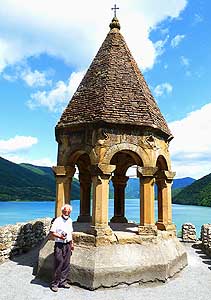
|
-
-
-
-
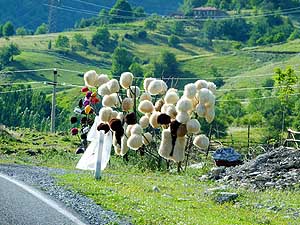
|
-
136
A ruin of an old chapel stands a bit
- lost on the shore of the Zhinvali Reservoir
- below the Ananuri Fortress
|
-
137
A remembrance picture with Emil at
- the small "pavilion" at the shore of the Zhin-
- vali Reservoir below the Ananuri Fortress
|
-
138
Who does not yet have a warm beanie,
- can buy one along the Georgian Military
- Highway leading to Kazbegi and Russia
|
-
- At 11am we are off to Kazbegi. It turns out to be a beautiful
ride along the Zhinvali dam on which bank the Ananuri Fortress is
situated. (Its picture decorates the cover of our current Lonely
Planet guidebook). Once more we admire delicate carvings and
icons before continuing along the green narrow valley of the
„Georgian Military Highway" towards the pass. It is quite touristy.
We encounter Germans, French, Armenians, Ukrainians with cars.
motorbikes and motorcycles. But most of the people are Russians who
either are returning home or coming from home.
|
-
-
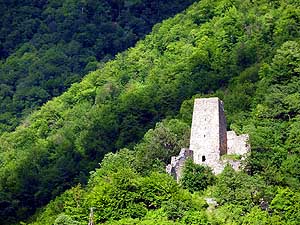
|
-
-
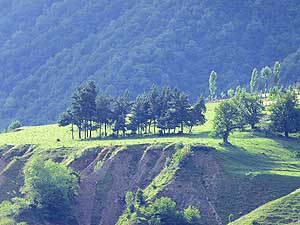
|
-
-
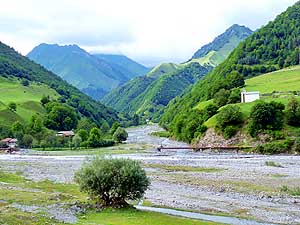
|
- The Georgian Military Highway leads us through diverse and
beautiful mountain scenery
|
-
139
The ruin of a fortress that sticks out
- of the forest green – about 5 miles before
- the switchback ascent to Gudauri
|
-
140
A place for a future holiday house?
- An open little plateau with a couple of
- trees, caught by the sun
|
-
141
A lovely valley at Kvesheti with
- the tiny church of Sepe and a few
- houses along the river
|
-
- After Gudauri, the ski resort, road construction work is
scarring badly the landscape. When the road deteriorates massively
and a German guy crossing us confirms that until Kazbegi it will
remain like that, we suddenly run out of steam to struggle for
further 15 miles [25km] the more that darkness is also creeping in.
We return shortly after the 7'792 ft. [2'395m] high Jvari Pass and
find soon a wonderfully quiet night spot on one of the big empty ski
lift parkings. We are on an altitude of 7'218 ft. [2'200m].
|
-
-
-
-
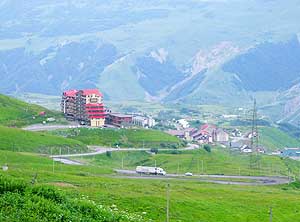
|
-
-
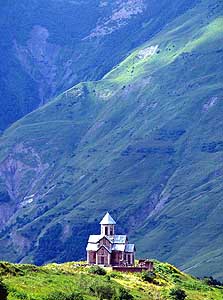
|
-
-
-
-
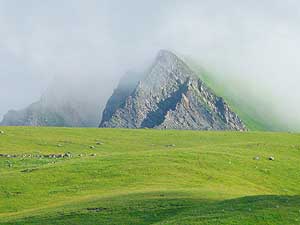
|
-
142
The ski resort of Gudauri is located at
- the heart of the Caucasus with 10 miles of
- slopes of different difficulty grades and a
- chairlift rising from 6'530 ft. to 10’730 ft.
- Skiing season is from December to mid-April
|
-
143
A little church near Gudauri
- impresses by its setting against the
- backdrop of a towering mountain slope
|
-
144
Morning mist sails along the mountain
- peaks above Gudauri when we crawl early
- morning out of our LandCruiser at the
- parking of the ski lift station. We are at
- an altitude of 7’220 ft.
|
-
- The night in our warm sleeping bags was relaxing. Mist is
creeping over the mountains when we get up. It is cold. We take our
breakfast in the LandCruiser and then start our way back. A
sulfurous fountain in the middle of nowhere seduces us to wash our
car. Was it a good idea? Not so sure: A white dull coat is now
covering our otherwise shiny LandCruiser. We are eager to find a
fresh water source, which in the mountainous area of the former
Soviet Union do exist here and there. There we thoroughly treat the
whole body with fresh mountain water and are stunned by the result:
It now shines even more intensively than before.
|
-
-
-
-
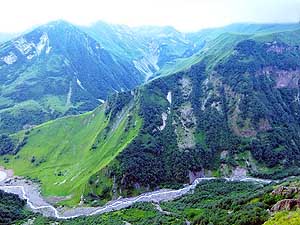
|
-
-
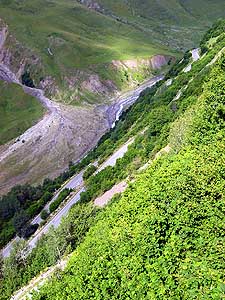
|
-
-
-
-
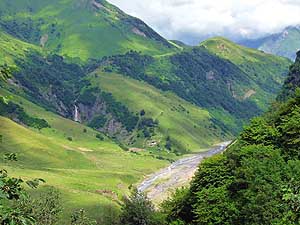
|
-
145
Around Kazbegi the Caucasus offers
- wild high mountain scenery: Below the
- Aragvi river, and behind the mountains
- in direction southwest lies the breakaway
- province of South Ossetia
|
-
146
The Georgian Military Highway
- offers a diversified mountain drive through
- all kind of terrain – here the ascent by
- switchbacks to Gudauri
|
-
147
The view of the upper northerly
- Aragvi valley
|
-
- Mid-afternoon the skies darken again and it starts to rain. We
book once more into the Tamarindi Hotel in Mtskheta and are sorry
for the brides who have their wedding photos taken in the cold and
rain in front of the cathedral. We wash some clothes, watch TV, read
newspapers in the internet, write the diary and update statistics.
|
-
-
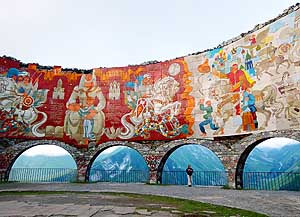
|
-
-
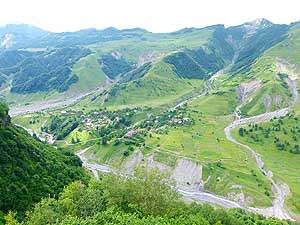
|
-
-
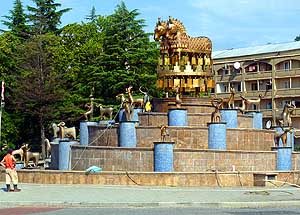
|
-
148
Colorful motifs decorate the viewing
- platform, called Soviet-Georgian Friendship-
- Monument, nearly on the top of the Jvari-,
- Cross- or Dzhvris Ughelt-Pass. Like the
- names of this crossing differ, the indication
- of its height vary too: 7'858 ft. [2'395m];
- 7'805 ft. or even 9'695 ft.
[2'955m]
|
-
149
Across the Aragvi River small
- settlements with neat houses and gardens
- are greeting. Thanks to the Georgian
- Military Highway people are not totally
- cut off from the rest of the world
|
-
150
A lovely animal roundabout in
- Kutaisi, Georgia's second largest city
- (200’000 people) after Tbilisi. It is
- situated halfway to the
- Black Sea in the west
|
-
- Next morning we take off on the monotonous M1 road from Mtskheta
to the west towards the Black Sea. Along the road potteries,
basketwork and especially mushroms are on sale. „Stop! Do they fill
up gas containers here?“ I ask Emil. He backtracks and indeed a
private person is selling gas out of a small tank. We pay 10 Lari
for our 1 gallon [2¼kg] gas cooker which just showed to be empty two
days ago. That was luck!
|
-
-
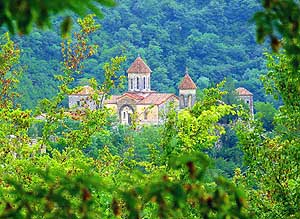
|
-
-
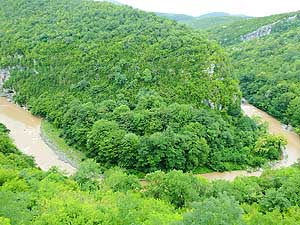
|
-
-
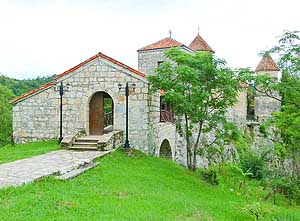
|
-
151
Four miles from Kutaisi within lush
- green hills sits the little Motsameta
- Monastery on an impressive
- promontory .....
|
-
152
..... it offers a spectacular view to
- a bend of the Tskhaltsitela River, which is
- surrounded by a jungle-like vegetation
|
-
153
The Motsameta Monastery is a jewel
- of an old dignified monastery where bearded
- monks in black robes glide along the garden
- path and where monastery life can be
- comprehended
|
-
- Last time in Oman, we only
succeeded because Lara, our nice Swiss host in Muscat, knew the gas
man well, who helped us out and even sold us a new gas container
made in China! Filling up cooking gas can be quite nerve-wracking.
The longer the more the empty bottles are only exchanged for full
ones. Together with our Brasilian gas bottle, which up to now could
not be refilled anywhere, we carry along three of them. In the
evening we reach Kutaisi and book into the Argo Palace for 50 Lari.
|
-
-
-
-

|
-
-
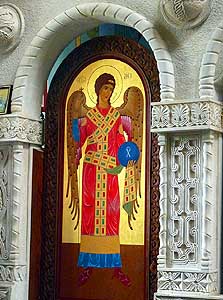
|
-
-
-
-
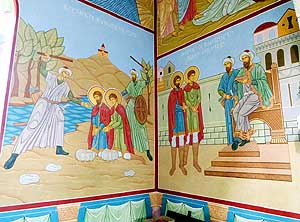
|
- Every inch of the Motsameta Monastery is covered with beautiful
frescoes.
- Because in 1923 a fire destroyed everything, they had to be
completely restored
|
-
154
|
-
155
|
-
156
|
-
- A beautiful sight with view to the bend of the Tskhaltsitela
River (red water) surprises us 3¾ miles [6km] outside of Kutaisi. We
are standing on a shoulder of rock in front of the small Motsameta
Monastery embedded into a jungle scenery. It is a gem of an old,
venerable monastery with beautiful frescoes, where bearded monks
silently scurry around. A short walk leads from the parking through
a forested area with mosses, mushroms, blackberries and
pomegranates.
|
-
-
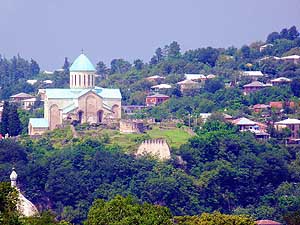
|
-
-
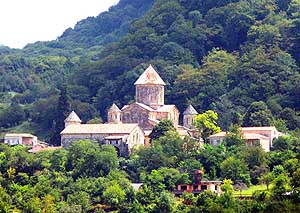
|
-
-
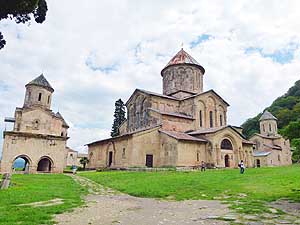
|
-
157
The region around Kutaisi is blessed
- with many churches. Here the Bagrati
- Cathedral in Kutaisi itself – a UNESCO
- World Heritage Site – called also
- “Cathedral of the Dormition”
|
-
158
6 miles northeast of Kutaisi the
- towers of the rather commercialized
- Gelati Monastery complex rise from a
- wooded hillside. It’s another UNESCO
- World Heritage Site .....
|
-
159
..... it contains the "Cathedral of
- the Virgin", the smaller "Church of
- St. Nicholas" and the Academy, where
- philosophy, theology, sciences and
- painting were studied
|
-
- What is especially nice is that it's less commercialized and
that the real monastery life can still be felt. The contrary is the
case at the „Cathedral of the Virgin“, 5½ miles [9km] northeast of
Kutaisi. There we are greeted by the omnipresent souvenir shops.
Despite of it, the splendor of frescoes, built between the 12th and
18th century is well worth the visit.
|
-
-
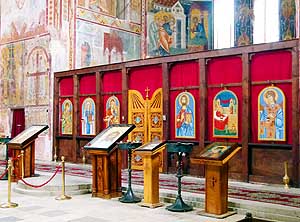
|
-
-
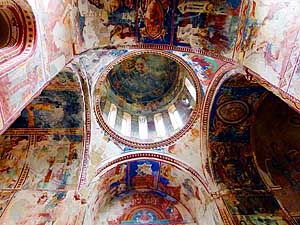
|
-
-
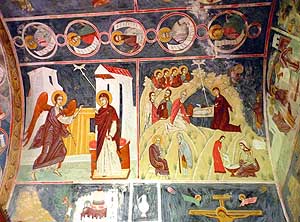
|
- The churches contain a whole range of wonderful frescoes, painted
between the 12th and 18th century
|
-
160
|
-
161
|
-
162
|
-
- After these two special sights we continue our drive direction
west. Short of Zugdidi at the Abkhazian
border we stop at a little meadow next to the road for a lunch break
and I start to cook. It does not take long until we get visitors:
The police in a civil car. „Tourist Schwitzaria“ (Швейцария) we
explain like we always do. But the two policemen remain persistently
in our vicinity and start to phone. They get on our nerves because
now we do not dare to drink a second beer. May be they just wait for
it in order to snatch us!
|
-
-
-
-
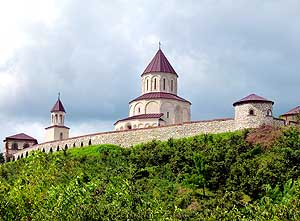
|
-
-
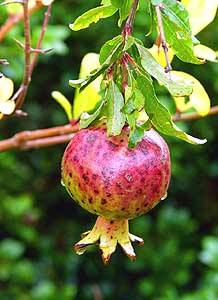
|
-
-
-
-
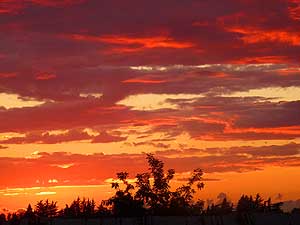
|
-
163
Residence of His Holiness and
- Beatitude, Catholicos Patriarch of All
- Georgia, Ilia II, also Archbishop of
- Mtskheta-Tbilisi near Zugdidi at Munchia,
- 2½ miles northwest of Khobi (between
- Senaki and Zugdidi in the west of Georgia)
|
-
164
The pomegranate (Punica
- granatum) grows also in the Caucasus.
- At first the fruit is green and then
- changes into orange-red
|
-
165
In Zugdidi (80’000 people),
- the border town to Abkhazia and starting
- point to the "Svaneti high mountain" region,
- the setting sun puts the sky in flame
|
-
- We are already washing our dishes when a car marked „Police“
arrives to replace the two guys. What’s going on? Are they
supervising us? It parks beneath a shady tree along the road. But
nothing happens. We just can imagine that they clarified in between
if we are in the country legally. Soon after we reach Zugdidi, the
starting point to the mountainous „Svaneti“ region, and check into
the Hotel Zugdidi for 50 Lari.
The sky darkens and it starts raining
like hell once more. We are happy to be comfortable and dry.
|
-
- The "Greater"-Middle East trip 2012/13:
- Sharjah/Dubai/1st Traveler's Festival/Emirates
National Auto Museum - UAE with
car Nov. 2012 to Jan. 2013 - part 1
- Western UAE - Liwa - United Arab Emirates with car in January 2013 - part 2
- Oman 2013 - Part 1 - February
2013: Musandam Peninsula
- Oman 2013 - Part 2 - February
2013: Sohar - Muscat - Rustaq - Nizwa
- Oman 2013 - Part 3 - March
2013: Sur - East Coast - Island of Masirah - Dhofar
- Oman 2013 - Part 4 - March
2013: Salalah & Surroundings (Dhofar) - Nizwa
- Oman 2013 - Part 5 - March 2013: Western Hajar
Mountains
- Al Ain, Eastcoast & Ras al Khaima - United
Arab Emirates with our car in April 2013 -
part 3
- Iran -
Ppart 1: Ferry Port Bandar Abbas-Shiraz-Persepolis-Pasargad (between Persepolis and Yazd)
– May 2013
- Iran -
Part 2: Pasargad
(excl.)-Yazd-Esfahan – May 2013
- Iran -
Part 3: Esfahan
(excl.)-Chelgerd-Hamadan-Sanandaj-Orumiyeh-Turkey Border
– May 2013
- Turkey: Iran Border-Esendere-Hakkari-Van-Doğubayazıt-Kars-Ardahan-Hopa-Georgia
Border – May/June 2013
- Georgia -
Part 1: Turkey Border-Ajaria-Gori-Tbilisi-Kakheti-Azerbaijan
Border – June 2013
- Azerbaijan: Georgia Border-Balakən-Şəki-Lahıç-Baku-Xınalıq-Quba-Laza-Baku-Gəncə-Georgia Border – June 2013
- Armenia - Part 1: Georgia Border-Haghpat-Dilijan-Sevan-Tatev-Goris-Nagorno Karabakh – July 2013
- Nagorno-Karabakh:
Armenia-Stepanakert-Gandzasar-Martakert-Tigranakert-Tnjri-Shoushi-Armenia – July
- Armenia -
Part 2:
Nagorno Karabakh-Goris-Tatev-Noravank-Khor Virap-Echmiadzin-Yerewan-Geghard-Gyumri-Georgia Border – July 2013
- Georgia -
Part 3a:
Zugdidi-Swaneti-Zugdidi-Abkhazia Border – July/August 2013
- Abkhazia: Georgia-Sukhumi-Tsebelda-Novyy Aton-Lake
Ritsa-Gagra-Pitsunda-Georgia – August
2013
- Georgia - Part 3b: Abkhazia Border-Poti-Ferry to Ilyichevsk/Ukraine
– August 2013
|
|
|
![]()
